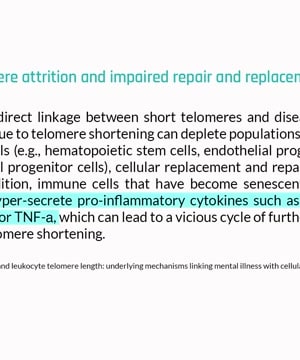What is telomerase?
Sources:
Telomerase is an enzyme that plays a critical role in the aging process by maintaining and rebuilding telomeres, the protective caps at the ends of chromosomes. Telomeres protect the genome from damage and wear down over time due to cell division and stress, making them biomarkers for aging. Telomerase helps to rebuild these telomeres by adding back DNA base pairs, essentially extending the lifespan of cells and enhancing their ability to replicate.
Telomerase activity varies among different cell types and is particularly important in stem cells, where it is more active compared to somatic cells. This enzyme helps to ensure that stem cells can continue to divide and replenish tissues throughout an organism's life, making it a key player in cellular health and longevity. However, the relationship between telomere length and aging is complex, as longer telomeres can also increase the risk of certain cancers, indicating that there needs to be a balance in telomere length for optimal health outcomes 1 .
RELATED QUESTIONS
